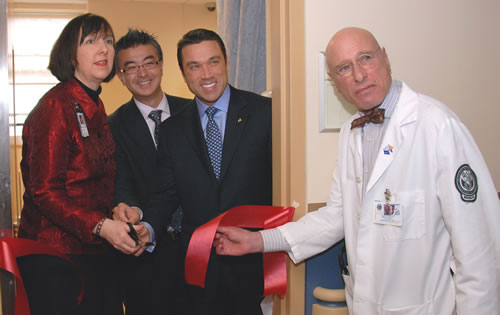Simulation Centers Increasingly Established At VA Medical Centers
On April 4, the Veterans Health Administration (VHA) celebrated the grand opening of the New York Harbor Healthcare System's new Simulation Learning Centers. The ribbon-cutting in Brooklyn was the first of two ceremonies to showcase the state-of-the-art simulation centers, housed at the Brooklyn Veterans Administration (VA) and Manhattan VA Medical Centers. The mission of the centers is to provide the opportunity for VA clinical staff, residents and students to develop skills through simulation to improve staff safety and Veteran care.

L-R: Martina Parauda, Director of New York Harbor Healthcare System; Dr. Haru Okuda, National Medical Director for the Veterans Health Administration (VHA) Simulations Learning Education and Research Network program; Congressman Michael Grimm (R-New York); and Dr. Barry Goozner, Co-Chief, General Medicine and NY Harbor, cut the ribbon on the new Simulation Learning Center and the VA�s Brooklyn Campus
The event began with a welcome from Martina Parauda, the Medical Center Director for New York Harbor Health Care, and remarks from Dr. Andrew Adler, the VISN Designated Learning Officer, and Dr. Barry Goozner, Co-Chief of General Internal Medicine, Brooklyn Campus. Several honorary guests attended, including Congressman Michael Grimm, a former Marine, and Dr. Ian Taylor, Dean of the SUNY Downstate Medical School. The ribbon-cutting concluded with a tour of the simulation center. The center includes a fully-equipped clinical simulation suite with a dedicated control room and debriefing space, surgical skills lab, and procedure room housing equipment that includes an advanced echocardiography simulator.
The inception of the Brooklyn Simulation Learning Center started over 10 years ago, out of necessity, as a low-fidelity simulation program focused on reducing the number of needle stick injuries. The project helped to reduce needle stick injuries from 14 to 0 per year over a few years and has continued to keep needle stick injuries down.
More such simulation centers will be needed throughout VHA to support the skills training of clinicians and to improve the safety and quality of health care for Veterans. As these centers emerge, the establishment of a strong national simulation presence, through SimLEARN, is critical to provide guidance and support to these new facility- and VISN-based simulation centers. The work by SimLEARN to develop a national strategic focus will allow VA to develop simulation best practices, as well as a national simulation curriculum based on evidence and clinical need. The establishment of these facility-based centers will, in turn, allow SimLEARN to coordinate the delivery of essential courses at the national level.



















